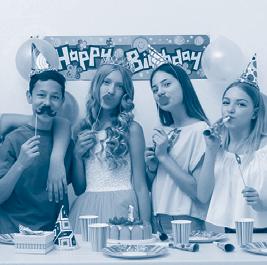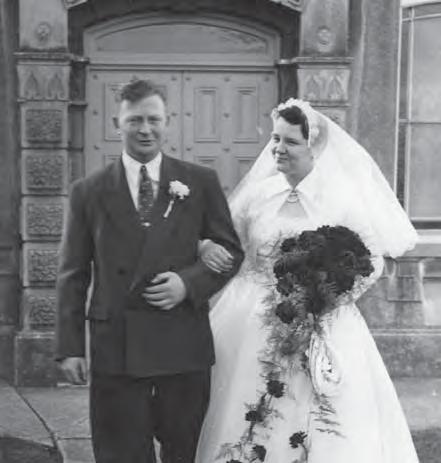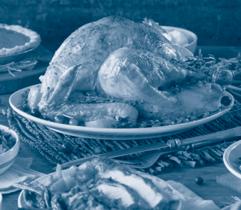
14 minute read
UNIT 2




Lead-in Lead-in
1 Complete the facts about Historical Figures. Use the words in the box.
Awards Greek obsessed deaf disappeared poetry childhood lighthouse Prizes lightning suggested painted dedicated consisted gliders died
1 Leonardo da Vinci was born in the town of Vinci. He __________________ Mona Lisa and
The Last Supper. He designed hang __________________, helicopters and musical instruments.
2 Pablo Picasso’s name __________________ of 23 words. He produced more than 1,200 sculptures and 1,800 paintings and also wrote __________________ and plays.
3 Nikola Tesla was born during a violent __________________ storm. Historians say that he was __________________ with number 3, hated pearls and wouldn’t touch hair.
4 Maria Callas was a world famous soprano. She was of __________________ origin and she lived in New York City. Her biographers say she had an unhappy __________________ .
5 Marie Curie received two Nobel __________________ for physics and chemistry. Her daughter Irene also received one for chemistry. She __________________ due to exposure to radiation.
6 Amelia Earhart __________________ in July 1937 and was declared dead two years later. She had a __________________ built in her honour on Howland Island in the Pacifi c Ocean.
7 Walt Disney won 22 Academy __________________ for his work. He wanted to name his famous mouse Mortimer, but his wife __________________ the name Mickey.
8 Ludwig van Beethoven became almost completely __________________ by the age of 44. He was best known for his nine symphonies. He __________________ the third one to Napoleon.
Reading
1 Match the words in the box with the explanations.
the sick the homeless the disabled the poor the leprous
1 2 3 4 5
____________________ – the opposite of the rich ____________________ – the opposite of the healthy ____________________ – people suffering from leprosy ____________________ – people with no home and living on the streets ____________________ – people with limited movements, senses or activities


2 Complete the sentences by using the correct form of the words in CAPITALS.
1 Who was her ____________________ guide when she decided to go to India? 2 My aunt collects ____________________ artefacts and books. 3 She was a great humanitarian and was ____________________ to all in need.
4 He used to be quite a ____________________ child. 5 When did Gandhi lead the fight for Indian ____________________ ? 6 What did Gandhi’s ____________________ name Mahatma mean in Sanskrit?
7 Mother Teresa had some basic training in ____________________ . 8 He had a huge, ____________________ smile on his face. He made a point! 9 Mahatma Gandhi was known for his ____________________ resistance to the British rule.
10 There should not be any barriers considering sex, ____________________, class or national origin!
SPIRIT
RELIGION
KINDNESS
DISOBEDIENCE
INDEPENDENT
HONOUR
MEDICAL
TRIUMPH
NON-VIOLENCE
RACIAL
3 Order the words to make sentences about Mahatma Gandhi and Mother Teresa.
1 At ▪ Ireland ▪ age ▪ become ▪ the ▪ of ▪ 18 ▪ she ▪ nun ▪ went ▪ to ▪ to ▪ a
2 At ▪ London ▪ age ▪ went ▪ the ▪ of ▪ law ▪ 19 ▪ he ▪ to ▪ to ▪ study
3 order ▪ colony ▪ established ▪ a ▪ leper ▪ orphanage ▪ an ▪ numerous ▪ and ▪ for ▪ clinics ▪ sick ▪ The ▪ the
4 was ▪ He ▪ one ▪ famous ▪ of ▪ most ▪ the ▪ leaders ▪ promoters ▪ and ▪ in ▪ justice ▪ of ▪ world ▪ the
5 salt ▪ on ▪ 388 ▪ Britain ▪ a ▪ put ▪ tax ▪ kilometres ▪ Gandhi ▪ decided ▪ to ▪ Dandi ▪ walk ▪ to ▪ When
4 Decide who these interesting facts refer to – Mahatma Gandhi or Mother Teresa. Write their initials in the boxes provided.
► An international airport is named after this person. ► This person’s birthday is a national holiday in India. ► This person was very shy as a child and had bad handwriting. ► This person was fl uent in five languages.


B Grammar Used to and Would
1 Cross out would in the sentences where you cannot use it. You can use both used to and would in some sentences.
1 Amelia Earhart used to / would collect frogs and insects as a child. She and her sister used to / would be very adventurous children. 2 My dad used to / would like wearing a moustache when he was young. 3 Some people used to / would hate Picasso’s paintings at first, because they didn’t understand them. 4 My granny used to / would listen to opera for hours. She used to / would be an opera singer. 5 Our grandad used to / would be a history teacher. He used to / would tell us many interesting stories, especially from the Second World War. 6 Einstein used to / would have problems with speech and his parents parents used to / would worry that he wasn’t very intelligent.
2 Circle the correct option.
1 I used to / would be fascinated by film stars. I am not any more, ore,
I have grown out of it. 2 We didn’t use to / used to know anything about Leonardo da
Vinci, but now we do. 3 The British used to / would eventually release Gandhi. 4 People used to / didn’t use to think that Albert Einstein’s ideas were strange and impossible. 5 My grandad Peter would / wouldn’t go to bed before he read a a historic book. He used to / would love reading them. 6 My dad would / used to often read for hours about famous historic people and then he would / used to always retell me the the most interesting facts.



3 Write true sentences about yourself when you were 8 years old. old.
Use used to / didn’t use to or would / wouldn’t and the ideas below. below.

► wear my older sister’s / brother’s clothes ► do cartwheels ► be outgoing ► handle disgusting animals ► dress like a superhero ► have a pet
When I was eight years old,
1
2
3
4
5
6
Vocabulary and Listening
1 Complete the phrases with a suitable word.
The fi rst letter is given.
1 As s _ _ _ _ _ _ as it may seem it turned out just fi ne. 2 They started dating and p _ _ _ _ _ soon they fell in l _ _ _ . 3 No w _ _! A matchmaker paired you! 4 Thank g _ _ _ _ _ _ _ for ‘aunt’ Jessica! 5 Your father and I had a g _ _ _ laugh. 6 Later that night your dad asked me on a d _ _ _ .


2
2.03
Listen and circle the odd one out in each column.
/ɑ:/ /ᴂ/ /і:/ /ᴐ:/ /u:/ /ɜ:/
party and similar before mutual aside but handsome me gorgeous soon fi rst
father well leave your couldn’t turn laugh that seem ago you early
3
2.04
Listen to the dialogue. Fill in the table with the missing information.
Where did Joshua’s parents meet? When did they meet? How did they meet?
At the ____________.
About twenty years ____________. Through a ____________ friend. Her name was ____________.
4a Match the words with the defi nitions.
1 gorgeous 2 matchmaker 3 mutual 4 similar 5 well-mannered 6 handsome a) look like somebody or something without being exactly the same b) good-looking c) polite d) very pleasant or extremely beautiful e) shared by two or more people f) someone who arranges romances or marriages
4b Use the words 1–6 from ex. 4a to write your own sentences.
1
2
3
4
5
6
D
Grammar Gerund vs. Infi nitive
1 Circle the correct option.
1 I can’t stand people to tell / telling me what to do. 2 She stopped to buy / buying the latest edition of her favourite magazine. 3 We are looking forward to meet / meeting your brother. 4 My boyfriend and I want travelling / to travel to Paris next year. 5 My mum won’t let me stay / staying at the party until midnight. 6 I remember going / to go to that restaurant with my parents when I was a boy.





2 Cross out the incorrect option.
1 She suggested going / to go to that new café for her birthday. 2 They managed preparing / to prepare everything for her arrival. 3 You promised coming / to come to my birthday party. 4 They discussed to postpone / postponing their honeymoon.


3 Complete the sentences with the words in the box.
mind refuse apologize makes avoids promise can’t help
1 Can I go to the party, Mum? I _________________________to to come home by 11 o’clock. 2 She _________________________ thinking about the boy she met at the party. 3 Would you _________________________ telling me the truth, please? 4 I _________________________ to lie to her. I never tell lies, especially to my friends. 5 My best friend is so funny. He always _________________________ me laugh. gh. 6 I _________________________ for being late. I’ll make it up to you. 7 He _________________________ talking about his ex-girlfriend.
4 Complete the sentences about yourself. Use gerund or infi nitive.
1 I love ________________________________________________________________________ ________________ . . 2 I hate ________________________________________________________________________ . 3 I can’t help ____________________________________________________________________ . 4 I always forget _________________________________________________________________ . 5 I need ________________________________________________________________________ . 6 I would like ___________________________________________________________________ . 7 I stopped _____________________________________________________________________ . 8 I have decided _________________________________________________________________ .
5 Match sentence halves.
1 We need 2 She refuses 3 Nicholas doesn’t mind 4 Rebecca made me 5 Sean apologized for a) go to my ex-boyfriend’s party. b) leaving the party early. c) to believe that he has forgotten about it. d) cleaning his room. e) to set our wedding date.
6 Put the verbs in brackets into the correct form, gerund or infi nitive.
1 We managed _________________ (settle) our differences. 2 Our parents enjoy _________________ (listen) to music and _________________ (dance). 3 I adore _________________ (go out) and _________________ (have) fun with my friends. 4 I have decided _________________ (visit) my grandparents this week. 5 He promised _________________ (take) me to the cinema. 6 My sister and I need _________________ (help) our mum clean the house.
7 Put the verbs in brackets into the correct form, gerund or infi nitive. Pay attention to the change in meaning after the verbs forget / regret / remember / stop.
1 Don’t forget _________________________ (bring) me your pocket-sized guide to Vienna. 2 I forgot _________________________ (tell) Julie about the party. I’ll tell her tomorrow. 3 Patty regrets _________________________ (invite) Bill to her birthday party.
He picked a quarrel with her boyfriend and ruined everything. 4 We regret _________________________ (say) that the party is over. 5 I remember _________________________ (throw) a huge party when I moved into my new fl at. 6 Please remember _________________________ (lock) the door when you go out.. 7 Will you stop _________________________ (make) so much noise? I’m trying to sleep. 8 She stopped _________________________ (buy) a cup of coffee in her favourite coffee shop.
8 Put the verbs in brackets into the correct form, gerund or infi nitive to complete the story.
My grandparents started __________________ (date) six months months before they got married. They both loved __________________ _ ____ (travel). Before they got married they agreed __________________ _ __ (travel) to Costa del Sol in Spain. When they returned from Spain n they decided __________________ (tie) the knot*. After the e wedding they were looking forward to to________________ (go) ) to their honeymoon. They chose __________________ (spend) ) their honeymoon on the Amalfi Coast in Italy. They loved it there. e. A month after that they considered __________________ (have) e) children. My mum and her twin sister were born a year later. Both of h of them enjoy ________________ (travel). They promised my brother and er and me __________________ (take) us to the Amalfi Coast next year.


Across Cultures
1 Write the missing parts of speech.
Verb
plot triumph march prosper vary
Noun
march
variety
Adjective
/ triumphant


prosperous


2 Complete the sentences with a suitable word from the table in exercise 1.
1 There were a lot of ________________ bands in the streets during the parade. 2 They planned a a________________ to kill the king. There were thirteen of them. 3 People in India think that goddess of wealth and ________________ brings good luck. 4 For Hindu people light signifi es the the________________ of good over evil. 5 The best chefs prepare a lot of vegetarian dishes, including ________________ fruits.

3 Match word halves to make useful expressions. Then write the expressions in the spaces provided.
Gunpowder ashes cranberry business squash harvest monkey citizens goddess of sauce family wealth bonfi re meal plentiful Plot fellow soup

4 Decide if the following statements are true (T) or false (F).
1 For Hindu people wealth is the symbol of hope. 2 People in the USA don’t celebrate Bonfi re Night. 3 Thanksgiving isn’t celebrated on the third Thursday in November. 4 Diwali is also known as Monkey Banquet. 5 Monkeys play an important role in Lopburi culture. 6 British people celebrate Thanksgiving Day.


5 Circle the correct preposition at the end of each question.
1 Who do the Americans gather with / for to celebrate Thanksgiving? 2 The Pilgrims had a plentiful harvest. Who did they give thanks for / to? 3 Hindu people have adopted several symbols. What is light the symbol of / off? 4 Lopburi Banquet attracts a lot of tourists. Who do the tourists have fun at / with? 5 Who do the locals in the town of Lopburi lay out a buffet for / on? 6 What typical sweets is Diwali famous of / for? 7 What traditional food is Bonfire Night associated with / by? 8 What kind of celebrations are people in Serbia interested for / in?

Writing A Thriller Story
1 Write a thriller story. Read the model text in the student’s book, p. 34 and the writing guide to help you.
Writing guide
Step 1 Choose a title for your thriller story. Here are some ideas: A mysterious woman in black, A strange man on the train, A house of evil or use your own ideas. You can begin or end your story with the words I / He / She will never forget that day / night ...
Step 2 > In the introduction describe where and when the story takes place and introduce the main characters. > In the main part mention what happened and what the characters did. Build up the suspense. > In the conclusion write what happened in the end and write a short commentary. Use as many linking words as possible to make your story fl ow. Here are some to help you.
Narration immediately, all of a sudden, suddenly, as soon as, before, after, when, during, later, soon, fi rstly, then, fi nally, in the end Contrast but, nevertheless, however, although, on the other hand, despite / in spite of Result so ... that, therefore, as a result Cause and reason because of, since Emphasis actually, especially, in fact, above all
Step 3 Check the use of the tenses – Past Simple, Past Continuous, used to / would and punctuation.
Story Title It all happened














